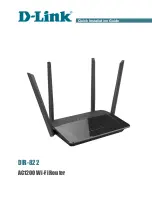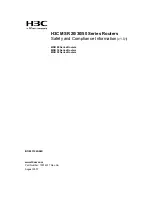
184 | Managing the Radio
Aprisa SRi User Manual 1.1.0
DSCP (Differentiated Services Code Point)
These settings provide translation / mapping between the external radio IP priority network and the radio
internal IP priority network, using the DSCP (DiffServ Code Point) priority field in the IP packet header.
Differentiated Services (DiffServ) is a new model in which traffic is treated by routers with relative priorities
based on the IPv4 type of services (ToS) field. DSCP (DiffServ Code Point) standard defined in RFC 2474 and
RFC 2475. DiffServ increases the number of definable priority levels by reallocating bits of an IP packet for
priority marking.
The DiffServ architecture defines the DiffServ (DS) field, which supersedes the ToS field in IPv4 to make
per-hop behaviour (PHB) decisions about packet classification and traffic scheduling functions. The six most
significant bits of the DiffServ field (in the IPv4 TOS field) is called as the DSCP. The standardized DiffServ
field of the packet is marked with a value so that the packet receives a particular routing/forwarding
treatment or PHB, at each router node. Using DSCP packet classification, traffic can be partition into
multiple priority levels.
The radio in router mode uses the DSCP value in the IP header to select a PHB behaviour for the packet and
provide the appropriate QoS treatment. The radio implements 4 priority queuing techniques that base its
PHB on the DSCP in the IP header of a packet. Based on DSCP, traffic can be put into a particular priority /
CoS (Class of Service) queue. Packets with higher CoS will always serve first for OTA transfer and on ingress
/ egress Ethernet ports.
The ‘DSCP priority definition’ tab is used to map ingress IP packet with DSCP priority to the radio internal
priority / CoS. Since, in most of the cases the radio routed network is connected to the corporate routed
networks, the network administrator might like to have a different routed network priority scheme of the
radio network, for example management traffic in the multi-gigabit corporate routed network might be
prioritize with DSCP EF (expedite forwarding) code (DSCP highest priority), and SCADA traffic with DSCP
AF11 (assured forwarding) code (high priority), but in the narrow bandwidth radio network, SCADA traffic
will be map to radio very high CoS / priority (i.e. set AF11 = Very high) and management traffic might map
to radio low CoS / priority (i.e. set EF = Low) in order to serve first the mission-critical SCADA traffic over
the radio network.
















































